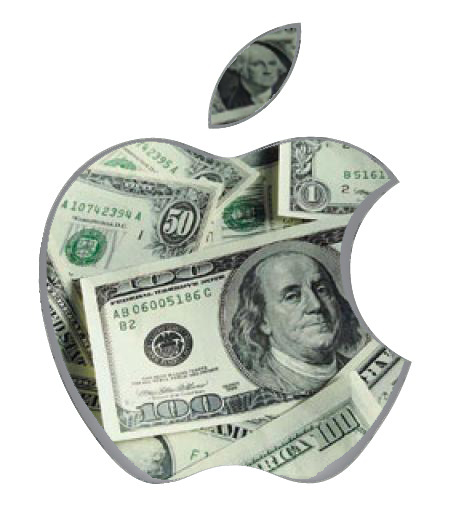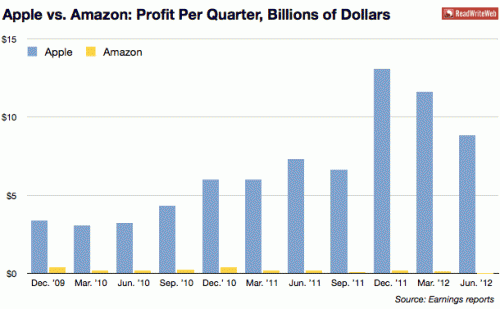As long as I can recall – since the days when I had an Apple ][+ at least – people have been quick to call out Apple for high prices. For me as a multi-OS person who also happens to like Apple products, it has been a roller-coaster. For a long time in the 80s the utility of Apple ][ and later the Mac made it very much worthwhile – and for some things a complete necessity.
Yet there have been many times – like most of the 90s – when the price to performance ratio simply wasn’t there. By the time Steve Jobs returned to Apple the only product of their I owned was a Newton MessagePad 2000 … which he promptly killed.
For the last decade, though, I have constantly owned some assortment of Apple products: from the G3-500 ‘Pismo’ laptop to the original iPod (which I still have, and it still works) to a long line or Powerbooks and Macbook Pros to loads of iPods and iPod touches and every iPad and so on. It is easy to look at me as an ‘Apple fanboy’ – every time I write something critical of Android I get plenty of ‘fan mail’. Yet since the mid-80s I have had a PC, and since 1992 always had a PC laptop. The HP Omnibook remains perhaps my favorite laptop, and the HP 200LX my favorite PDA. I have ONLY ever had Android smartphones, and have owned close to a dozen Android tablets and other devices. I am a tech lover who finds solutions to my needs more in Apple products than elsewhere. It has changed in the past and could change again.
Increasingly this year I have read about things related to Apple’s profitability and high margins that have caused me concern about the future of the company. I am not talking about the knee-jerk ‘this will kill Apple’ stuff in blog posts, but rather trends and indicators that lead me to think that an excessive focus on profitability might be doing Apple more harm than good. Here are a few:
Disproportionate ‘Profit Share’ to ‘Market Share’ Ratio
As I noted here, Samsung and Apple combined for 108% of profits in Q2, with Samsung reporting 37% of all profits based on 26% of global market share. More specifically for Apple:
Apple generated a 71 percent share of estimated Q2/12 handset industry operating profits with only 6.4 percent global handset unit market share
There are two ways of looking at this – Apple is doing a great job of maximizing profitability compared to the competition, or SOMEONE is paying MUCH more for Apple products than the competition. I mean, just comparing the Samsung and Apple numbers would indicate that Apple makes 8 TIMES more profit per smartphone than Samsung … and that doesn’t even take into account other competition!
While I have discussed Apple using cash to buy supply chain priority and lower pricing based on up-front payments and guaranteed volumes, it is clear that there are other reasons here, such as …
Onerous Carrier Subsidies
Let me make this simple – when you have the most iconic phone in the world, the ONLY one everyone refers to when they call their device a ‘___ killer’, and yet you have the two largest carriers actively trying to NOT sell your phone – you have a problem! And so … Apple has a problem.
Apple has the highest smartphone subsidies in the market at ~$400 per device, whereas the competition is ~$200-300, with higher subsidies for newer phones. That ~$150 difference has been used by carriers to claim that the iPhone is killing profits and has been shown to have led to the carriers instructing sales people to lead customers away from the iPhone to Android phones, sometimes extremely aggressively.
Yet let me be clear this is NOT a ‘real’ problem for a few reasons:
- The entire ‘iPhone killing profits’ thing has been debunked.
- The so-called ‘churn’ rate – the rate at which customers jump to a new OS or carrier at the end of contract – is LOWEST for the iPhone … by a LOT.
- When comparing the $150 subsidy difference to the profitability of a 24 month contract the difference is minimal, about the same as the difference between someone buying a $99 phone and a $199 phone. Taking much lower churn into account, and the ‘cost per customer’ has been found to be LOWER for a higher subsidy iPhone
But … what is the difference between a ‘real’ problem and a real problem? Perception. When you are Apple and have the largest valuation in history, and a pile of cash greater than the GDP of most countries in the world, no one wants to hear your technical explanation of why having a higher subsidy is meaningless. Rather than coming off as greedy, you come off as greedy and clueless.
Expensive Content
You know that cool new jazz album ‘Hot House’ by Chick Corea & Gary Burton that is $9.99 on iTunes? It is $9.49 on Amazon.
And you can search just about ANY music album and you will find the same thing. Books? Same. Movies? Same. In fact, as I kept looking I could find plenty of examples of Amazon being cheaper, plenty of examples of the prices being the same … but NO cases where iTunes was cheaper. None.
As Dan wrote, Apple claims that their content is ‘near break-even’ – whereas Amazon is supposedly looking to sell hardware cheap to make money on content. Turns out that the difference is context – how they define terms. Look at this profitability chart:
Do I have a problem with Apple making so much money? Absolutely not! But PLEASE don’t claim ‘near break-even’ when you are selling the same stuff as everyone else, taking a larger cut, and pricing higher than the competition. It is disingenuous.
‘Bottom Line-ing’ Retail
If you have ever spent any time in an Apple Store you know it is just about the best consumer electronics retail experience you can ever hope to have. That is because Steve Jobs and retail head Ron Johnson wanted the Store to be focused on customer satisfaction – I look at it as ‘bringing the reality distortion field to the mall’. Pricing is the same as online, but you can quickly get a feel for the products, get help from knowledgeable and friendly staff, and have technical issues solved (or get a price to solve them quickly). Even my wife, who hates tech stores, became enamored and decided an iPhone was for her … when she is ready!
Well, there have been plenty of issues recently as detailed at MacRumors, which goes on to say:
Johnson was champion of customer satisfaction, designing and staffing the stores to provide a superior experience for visitors and buyers alike. He was able to win over Steve Jobs with the concept that revenue and profit should be a secondary goal of Apple’s retail stores.
But in 2009, Jobs took six months of medical leave and put Tim Cook in charge of the company, including the retail stores. Cook is primarily an “operations guy,” sources explain, and his natural focus is revenues and profits, not customers. While Jobs was away, Cook and chief financial officer Peter Oppenheimer began to confront Johnson on his customer-centric retail philosophy—both felt the stores didn’t generate enough revenues to justify operating expenses.
Some of the issues noted are layoffs (just as we get ready for the holidays), reshuffling positions and pulling back promotions, dwindling hours – all of which leads to less staff working stores and therefore fewer people able to help customers. If Apple doesn’t realize that this will have a fast and direct impact … they should open up their ears.
What About Product Pricing?
Surprisingly, the item most anti-Apple folks cite frequently is one I am not concerned about: pricing of hardware. Apple charges a premium price for a premium product. When you look at products from Sony, HP, Lenovo, and Dell, the build quality is lesser, the non-marquee components are lower-grade, and so on. Reliability is lower, resale is MUCH lower, and on and on. Apple isn’t in the $300 laptop market … or even the $700 market.
As for tablets and phones and so on, their products deliver. The quality and build and finish of their products is unmatched. And when it comes down to it, no one releasing a product at the same time can do it with the same capabilities, same quality and same price as Apple – unless they are losing money.
What Does The FUTURE Hold?
This week Apple releases new products, and will go on to have a tremendous fourth quarter. I have no idea what they will launch, and really don’t care in terms of this article – because it doesn’t matter. (of course, on a personal level I care because I love this stuff!)
The concern I have is for 2014. Apple has sown seeds of discord with carriers over subsidies. Android manufacturers like Samsung have a long history of reverse engineering, dumping products into a market at a loss, and other semi-legal practices that have presented them as low-cost options … which is great for carriers and customers. And if Nokia and Microsoft can work with carriers to keep subsidies in check, then Apple looks even more like a greedy pariah and will slowly get pushed out of carrier retail focus.
Speaking of retail, Apple holds an amazing place as a ‘destination store’. Whether or not you buy, I have talked to few people – even anti-Apple folks – who don’t enjoy hitting the Apple Store. Nobody really LIKES going to Wal-Mart, you go there for price. And a focus on profits has made places like K-Mart and Sears so dingy that I feel like I need a bottle of Purel just touching stuff there. Apple has to choose a focus for the retail arm – profit or experience. As has been said, the person who focuses on two things focuses on neither.
Also, with the popularity of the Kindle Fire (and a lesser extent the Nexus 7), alternative ecosystems are becoming a reality. Amazon has a ‘use us anywhere’ strategy (Google has a ‘please buy SOMETHING from Play’ strategy), whereas Apple has the infamous ‘buy on Apple, use on Apple’ approach. Apple continues to hold ~80% of the global digital music sales market, with Amazon gobbling most of the rest. But as more and more people realize that you can buy on Amazon and have it auto-dump to iTunes (and if you have iTunes Match it will hit iCloud as well) … and do it for at least 10% less … Apple will lose there as well.
Decision Time for Cook
And so what I see for Apple is either some fundamental changes in how it operates and competes … or a slow slip out of the dominance it has enjoyed for so many years. The fear of 1984 and 1997 that has driven it so fiercely has turned to paranoia in some cases and arrogance in others, neither of which are health for running a business. Apple still makes some of the most amazing products, routinely produces more innovation than competitors, knows the path between functionality and usability, and does it all in an extremely well designed and robustly built package. Their future path is largely their own to create.
What do you think about Apple and the quest for maximum profitability?

